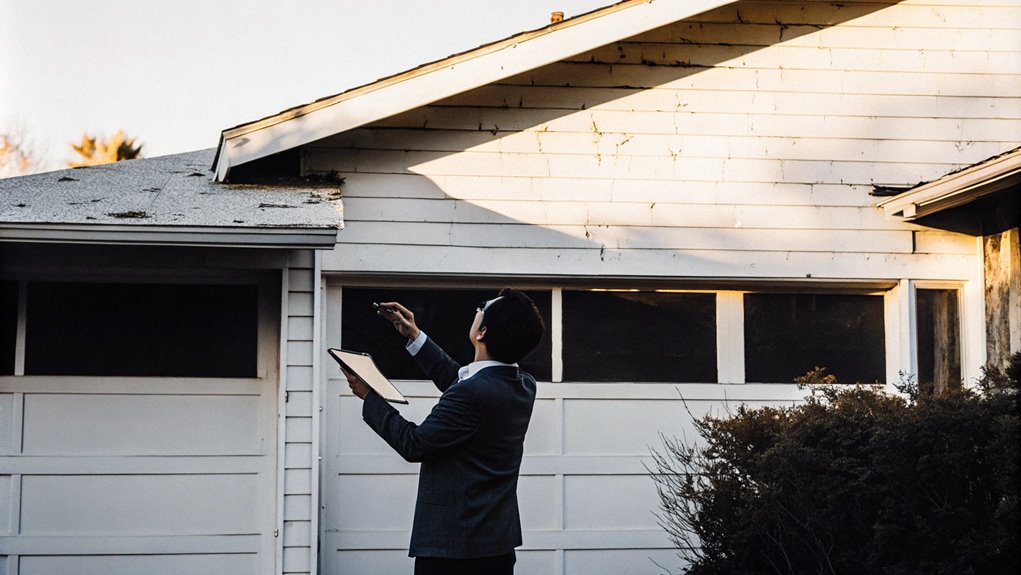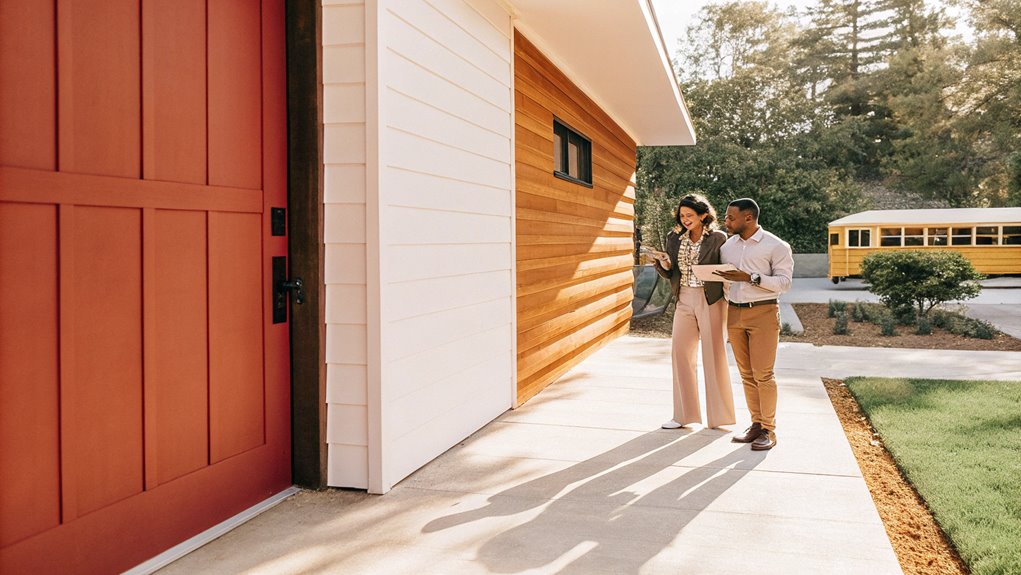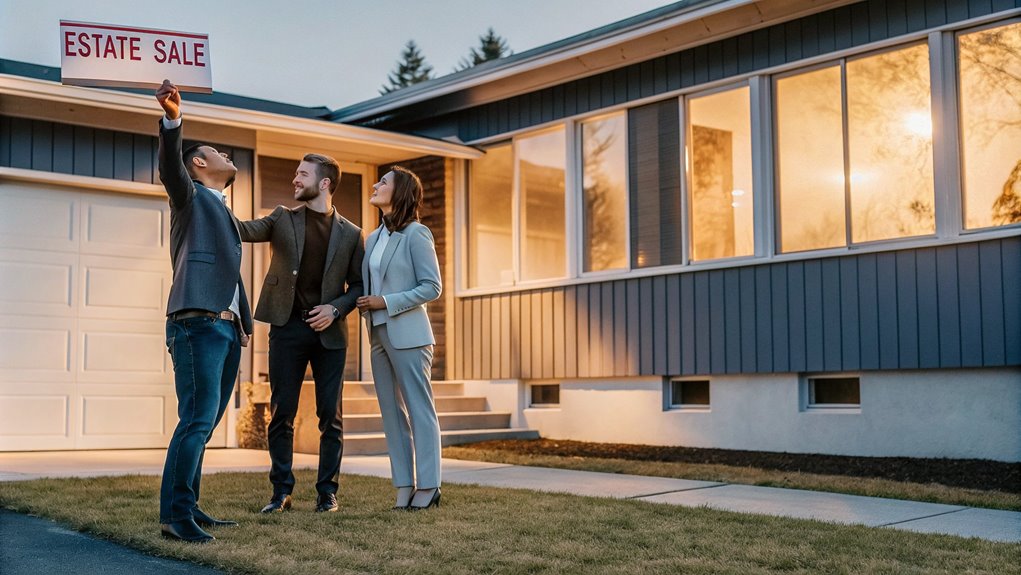Finding good home deals is easier when you know what to look for. First, look at what homes sell for in the area. See how big they are and what you pay for each square foot. Look for homes that sit on the market too long – these might be great deals.
Watch how the area is growing. Some homes cost less when owners need to sell fast. Keep an eye on sales after someone dies or when banks take over homes. These homes often cost much less than others.
Look at what nearby homes sold for lately. Check what the city says the home is worth. When you see price cuts, it might be time to buy.
Smart buyers look at lots of numbers and facts. This helps them find the best deals on homes that cost less than they should.
Ready to start building equity in your own Michigan home? Get your personalized home loan quote today.
Research Local Market Data

Finding good deals starts with knowing your local home prices. Look at what nearby homes are selling for right now. Check real estate websites and local records to learn about home prices in your area.
Watch how prices go up or down each month. Look at how long homes stay for sale. Make a list of homes like the ones you want to buy and write down their prices.
Keep track of homes that sell for less than others nearby. Make notes about homes that drop their prices or need to sell fast. This helps you spot the best deals in your area.
Tip: Write all this in a simple list. Update it every month to stay on top of what's happening with home prices near you.
Michigan residents, unlock the door to your new home. Request your home loan quote from Treeside Financial today.
Study Neighborhood Growth Patterns
Look at how many people moved to different areas over time.
When more folks keep moving to a spot, house prices often go up.
Watch where new shops and stores pop up too. These show that money is flowing into the area.
Also, keep an eye out for new roads, bus lines, or power lines being built. These help make areas better and worth more money.
Population Growth Over Time
Growing numbers of people tell us if homes will be worth more money later. It helps to look at how many people moved to an area over time.
Look at these key things:
- How many new people come each year
- The ages of people living there
- How much money people make
- Where people move from
- How many new houses are being built
Good deals can be found where lots of people are moving in but house prices are still low. The best spots are where more people want to live than there are homes to buy. Also look at job growth and new roads or schools being built.
| What to Check | What it Shows |
|---|---|
| Yearly Growth | Is growth smooth or jumpy |
| People's Ages | Who needs homes |
| Money Made | How rich the area is |
| Moving Trends | Do people like it here |
| New Houses | Room to grow |
New Business Development Areas
When new stores and offices open, smart people watch closely. This tells them where homes might be worth more money soon.
Look for new building projects in areas you like. Watch where big stores plan to open. When you see lots of new shops and offices, home prices often go up in 1-2 years.
Big stores like grocery chains and shopping centers are good clues. They do lots of homework before picking a spot. They know where people want to live and spend money. You can learn from their choices.
Your city has a place that shows where new buildings will go up. You can join local business groups to hear about new stores coming to town.
All this helps you find areas where homes might be worth more later.
Local Infrastructure Investment Plans
When you see lots of workers fixing roads or building things in an area, it means home prices might go up there soon.
Take a look at what your city plans to build in the next few years. You can find this on your city's website or at city hall.
Look for places where the city is spending money to make things better. This could be new roads, bus stops, or better water pipes.
When cities fix these things, homes nearby often sell for more money. In fact, home prices can go up by a lot within two years.
The best spots to watch are places where the city is doing many projects at once.
These areas often see the biggest jump in home prices. When you buy a house, think about all the good changes coming to the area too.
Look for Distressed Properties

Finding cheap homes is easy when you look for homes that need help. Here are three ways to find them.
First, look for homes the bank took back from people who couldn't pay. These homes often cost much less than others. You can find them at bank sales and court sales.
Next, watch for short sales. These happen when people must sell their home for less than they owe. Talk to real estate agents who help people with short sales. They know about these homes first.
Last, look for homes that need fixes. These can give you the best deals. Look for homes with old kitchens or bad heating systems.
Check how much fixes will cost. Then see how much the home could sell for after fixes. Look for big problems like bad walls or floors. Other buyers run from these homes, so you can get a better price.
Evaluate Price Per Square Foot
Let's look at how much homes cost for their size. Think of it like the cost of a slice of pizza – some slices cost more than others based on what's on them.
First, look at what other homes near you sell for. Make sure you only compare homes that are alike. Just like you wouldn't compare a big slice to a small one, don't mix up finished basements with unfinished ones.
The cost for each square foot helps you understand home prices.
But remember – things like a nice yard, new paint, or a pool can make some homes cost more than others nearby.
Compare Area Average Prices
Let's talk about finding good deals on homes by looking at prices in your area. First, check what homes cost per square foot in places you want to buy.
Check out these prices in different parts of town:
| Area | Avg $/Sq Ft |
|---|---|
| North End | $285 |
| Downtown | $425 |
| West Side | $195 |
| Suburbs | $165 |
| Waterfront | $495 |
Look for homes that cost less than what others cost nearby. A good deal is when a home costs at least 10% less than other homes in the area.
Think about:
- How good or bad the home looks
- Where the home sits in the area
- If home prices are going up or down
Keep an eye on homes that have been for sale for more than 90 days. These owners might want to sell fast and give you a better price. Make sure to look at what other homes sold for to know if you're getting a good deal.
Calculate Square Footage Correctly
Getting your home's size right is super important. Here's what to do:
First, grab a tape measure. Walk into each room and measure how long and wide it is. Don't skip the closets! But leave out spots like garages that aren't fixed up nice.
If your home has more than one floor, do each floor on its own. Then add them up. The stairs only count one time, not twice.
Some rooms have funny shapes. Break these into boxes to make it easier. Take out space for thick walls and spots where pipes and wires run.
Ask what counts as living space in your area. Different places have different rules. This helps you know if a home's price matches its true size.
Look Beyond Raw Numbers
Looking Past Simple Numbers
The price for each square foot is a good start when looking at homes, but there's more to think about. To find a great deal, you need to look at other things that make a home special.
Here's what else matters when you look at a home:
- How much sun comes in through the windows
- How easy it's to walk from room to room
- How tall the ceilings are
- What the yard looks like
- If there are big trees
- How much space you have from other houses
- How nice the home looks inside
- If the owners fixed things up lately
- How well they took care of the house
When you look at different homes, make notes about these things.
Give each home points for what it does well. This helps you find homes that are worth more than their price tag shows.
Monitor Days on Market

Watching how long a house stays for sale tells us a lot. If a home sits too long without a buyer, it might cost too much or have a hidden issue.
Keep an eye on homes that no one has bought in a while. In busy areas, look for homes that sit for more than 60 days. In slower areas, look for ones that sit more than 90 days. The owners of these homes often want to sell quickly and might take less money.
You can ask your real estate app to tell you when homes sit too long. Look for homes that drop their price over time. This means the seller might take a lower offer from you.
When other buyers pass on a home, you might get a good deal.
Compare Similar Recent Sales
When you want to find a good deal on a house, look at what other homes sold for recently. Pick houses that sold in your area in the last few months. Make sure they're like the house you want to buy.
Look at these things:
- How big the house is
- How many rooms it has
- When it was built
- What shape it's in
- Where it sits
- What schools are nearby
Make notes when houses are different. Say you find a house that sold for $300,000. It has a new kitchen but your house needs one. Take that cost off your price. This helps you know what a fair price should be.
Remember: The closer the house is to yours, the better. And newer sales tell you more than old ones.
Check Property Tax Assessments

Looking at property tax records can help you know if a home's price is fair. Your local tax office keeps these records. You can visit them or look online.
Most towns check home values once or twice a year. The tax value is often less than what homes sell for – about 80 to 90 cents on the dollar.
If you find a home selling for much less than its tax value, it might be a good deal. But first, look at why the price is low. The house might need fixes, or home prices in the area might've gone down.
Look at what other nearby homes sold for too.
Identify Motivated Sellers
People want to sell their homes fast for many reasons.
You can spot them when a house sits on the market too long or when the price keeps going down. Sometimes listings say things like "need to sell now."
Ask your agent about why the owner needs to sell. Maybe they got a new job far away. Maybe they split up with their spouse. Maybe they can't pay their bills.
When sellers need to move quickly, they often take less money for their home.
Signs of Urgent Sales
When people really need to sell their home fast, they often show it in how they act and what they write.
Keep an eye out for these key signs.
Watch for:
- Big drops in the asking price, like when a home gets cheaper by $10,000 in just a month
- Words in the listing that say "quick move-in" or "must sell soon"
- Sellers who say yes to easy payment plans right away
Look for homes that have been for sale much longer than others in the area.
After two months, most sellers get more eager to make a deal. They start to:
- Answer phone calls faster
- Let people see the house at any time
- Want to talk about the price more
When you see these signs, you can make an offer that works for both you and the eager seller.
Understanding Seller Circumstances
When buying a home, it helps to know why someone wants to sell. People sell homes for many reasons. Some are going through big life changes. They might be getting divorced or moving for a new job. Some got a house from a family member but don't want to keep it.
Some sellers already bought a new home. They've to pay for two homes at once, which is hard. Others may be having money problems. Some owners live far away and find it hard to take care of the house. Older folks who moved to nursing homes often need to sell too.
Look for words like "must sell" in home listings. See how long the owner has had the house. If they tried to sell before but couldn't, they might take a lower price now.
These clues can help you find good deals on homes.
Assess Property Condition

Walking through a house to check its condition helps you find good deals. You need to look at everything closely to know if the price is fair.
Look at these main things:
- Check if the base, roof, and walls are strong – these cost the most to fix
- Look at heating, cooling, power, and water pipes – these can be very costly
- See if floors, paint, and light fixtures need work – these cost less to fix
Take notes on what's wrong. Find out what local workers would charge to fix each thing.
Then look at what other fixed-up houses sell for nearby. If the cost to fix it's less than what you could sell it for, you may have found a good deal.
Calculate Renovation Costs
Want to fix up a house? Let's figure out how much it will cost.
First, make a list of the big things you need to fix:
- Parts of the house that need repair
- Things like heating and pipes
- Paint and new floors
- What workers will charge
Talk to at least three workers about each job. Ask them how much it will cost.
Don't forget the small stuff too:
- Papers from the city saying you can build
- Plans for the house
- Taking away old stuff
- A place to stay while work is done
Add 20% more money to your total cost. This helps when surprise problems pop up.
Keep an eye on what things cost at the store. Prices can go up or down a lot.
Write down every cost in a list. Ask workers who fix houses in your area if your costs look right.
Analyze School District Ratings

Good schools help homes keep their value. Let's look at how to check if schools are good.
You can look up school scores on websites like GreatSchools or Niche. These sites show how well kids do on tests. They also tell you how many teachers each school has.
When looking at schools, check:
- If test scores are going up over time
- If the school has special classes for smart kids
- If parents help out at school
Look at each school in the area. Some schools in the same area can be better than others.
Try to find homes near the best schools that still have fair prices.
Remember to compare schools to others in your state. This helps you know if the school is doing well or needs to get better.
Review Zoning Changes
Look for new rules about how land can be used in areas you like. Check your city's planning office website and go to local meetings.
Watch for places that might allow homes and shops to mix together – these spots often become worth more money later.
Look at new rules about how tall buildings can be, how many can fit in one spot, and if stores can turn into homes.
These changes can make property worth more or less over time.
Upcoming District Rezoning Plans
When cities plan to change how land can be used, it helps us see where home prices might go up. Your local city office makes maps that show these changes.
Look for these clues:
- When rules change to let people build more homes in one spot
- When new shops can open near homes
- When areas allow both homes and stores in the same place
To learn about these changes first:
- Go to public meetings
- Read city plans
- Join local groups that talk about these changes
- Get news from your city office
These changes can make a big difference in what homes are worth. Areas that get new shops nearby often see home prices go up.
Places that let more people live close together also tend to bring in new neighbors who want to live there.
Mixed-Use Development Opportunities
When we build in cities, we can put homes and shops in the same place. This helps people live near where they work and shop. Look for old one-story homes or empty lots. These spots can grow into tall buildings with stores on the bottom floor.
Check what the city allows you to build. Each area has rules about how tall buildings can be. Some areas let you build more than others. The best deals are when you can buy a house but build something bigger later. You can find these deals in areas that are growing fast.
Look at what others have built nearby. This shows you what works well. Think about how much money you could make if you build the biggest thing allowed.
Watch for Estate Sales

Estate sales can help you find great deals on homes. When someone passes away, their family often wants to sell the home fast. They care more about selling quickly than getting top dollar. This means you might get the house for much less – often 15-20% less than what it's worth.
Keep an eye out for homes that come from estates. Most families sell these homes within a year. The best deals show up in the first three months.
You can spot an estate sale home by looking for:
- Old fixtures and nothing new inside
- The owner's stuff still in the home
- More than one person making choices about the sale
To get these homes, tell the family you can buy fast. Be open to what they need. This helps when many family members are trying to agree on the sale.
Track Foreclosure Listings
Finding deals on foreclosed homes is like being a detective. You need to look in many places to find homes that banks own or that are being sold at the courthouse.
First, make a list of places to check. Look at county files, real estate websites, and your local paper. Sign up for alerts on websites like RealtyTrac. Make friends with bank workers who deal with these homes.
Check for new homes every day. Good deals go fast! You can also join groups of other home buyers to share what you know.
Keep a list of what you find. Write down:
- How the home looks
- What it might be worth
- What needs to be fixed
- Any problems with the sale
This helps you spot the best deals fast. Then you can act quickly when you find a good one.







